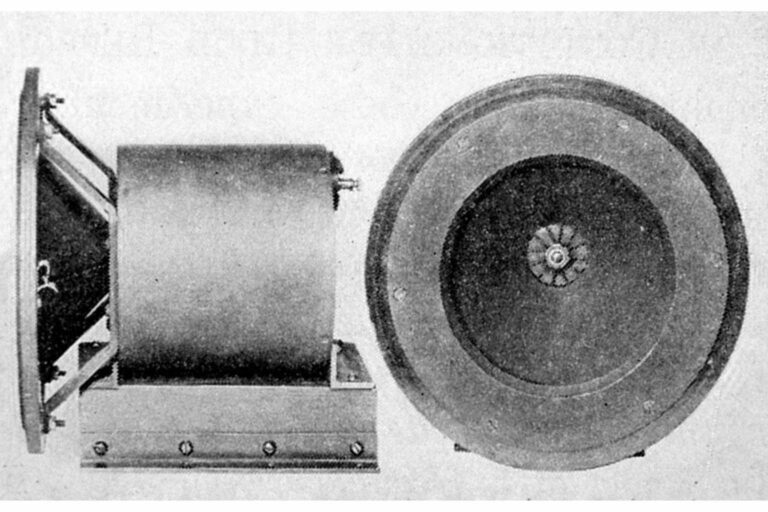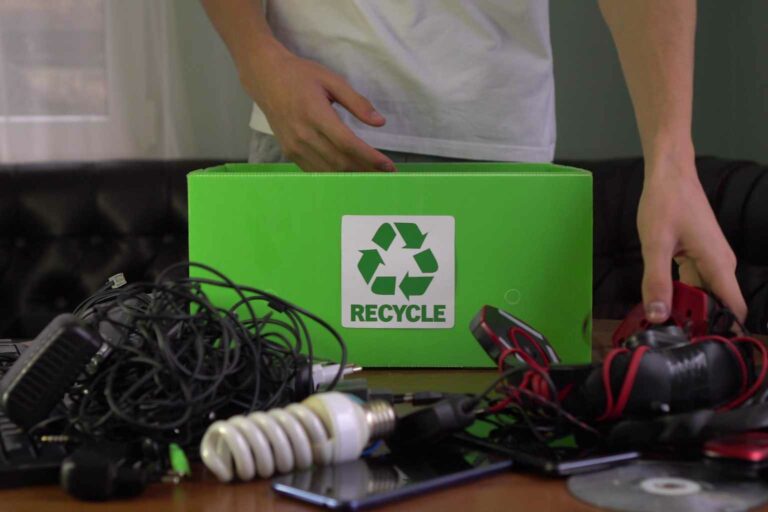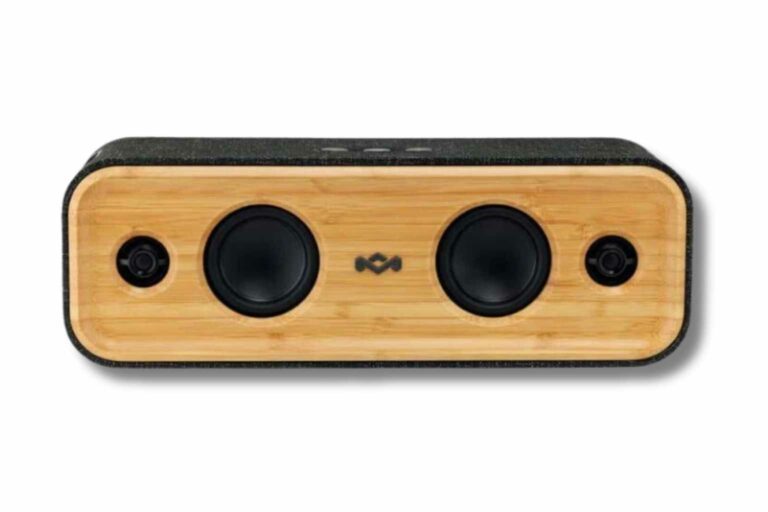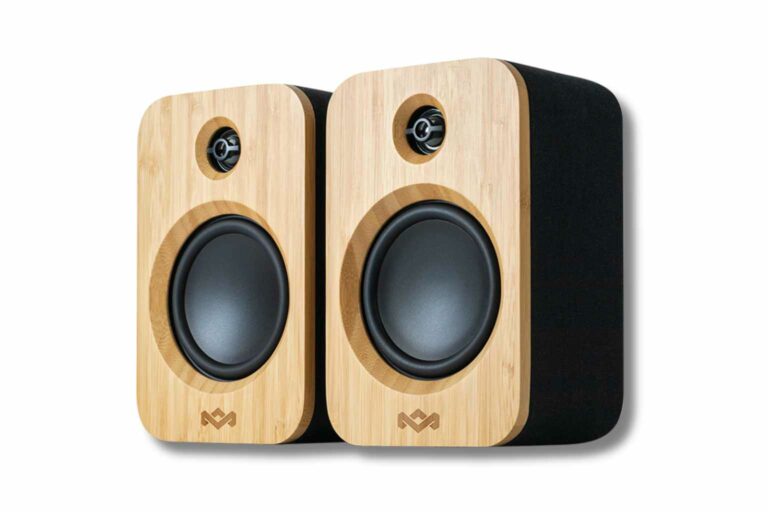
Sustainable Speakers: Introduction
This week we help you embark on a journey of eco-conscious sound with our latest focus on sustainable speakers.
Following the immense success of our sustainable headphones article, which resonated with thousands of avid readers, we delve deeper into the world of audio solutions that align with a greener future.
Read on to discover how our collective actions lead to better choices and a real impact on our planet. Let’s harmonise our love for music with a commitment to sustainability.
Together, we can make a difference.
Sustainable Speakers: A History
Audio speakers have a history dating back to the 1800s. In the late 19th century, Alexander Graham Bell and Thomas Edison were pivotal figures in the evolution of speakers. Bell’s invention of the telephone in 1876 was a catalyst, spurring further innovations. Edison’s work on the carbon transmitter, a crucial component of early telephones, greatly improved sound quality.
At around the same time, Emile Berliner introduced the dynamic microphone in the late 1800s, a significant leap in audio technology. It replaced the carbon transmitters, offering clearer and more reliable communication.
In 1921, Edward Wente, an engineer at Bell Labs, refined speaker design by introducing the moving coil principle. This innovation laid the groundwork for modern dynamic speakers, which remain widely used today.
Fast forward to the mid-20th century, and the advent of transistors revolutionised speaker technology further. Because of this, smaller, more efficient speakers, capable of producing higher-quality sound, became the standard.

As we reach today, technology has advanced and so has speaker design. Innovations like electrostatic and planar magnetic speakers have brought forth new levels of audio fidelity. To uncover the environmental impact of non-sustainable speakers and learn about eco-conscious alternatives, continue reading. Understanding the past helps us shape a greener future in audio technology.

Non-Sustainable Speakers: Environmental Impact
Non-sustainable speakers, those produced without eco-conscious practices, have a significant environmental footprint. With estimations that billions of speakers are manufactured every year, the impact is magnified considerably.
Mining for materials like rare earth metals and metals like aluminium and copper is one of the initial stages. This process disturbs ecosystems, releasing harmful pollutants. The overseas manufacture of speakers involves long-distance shipping, contributing to carbon emissions. Furthermore, packaging materials, often single-use plastics, add to environmental degradation.
During production, enormous energy and water resources are consumed. These resources are often drawn from unsustainable sources, impacting local communities. Not only that, but once non-sustainable speakers reach the end of their life cycle, they contribute to electronic waste. Improper disposal can lead to soil and water contamination.
Additionally, the distribution of these speakers involves extensive transportation, emitting more greenhouse gases.

To learn more about how you can make environmentally conscious choices when it comes to speakers and reduce your carbon footprint, continue reading. Facts and actionable steps are essential for creating a more sustainable future.
Sustainable Speakers: What to Look For
When looking for sustainable speakers, there are several things you should consider. Firstly, look for energy efficiency to reduce power consumption. Try finding models with high-efficiency amplifiers and low standby power. Moreover, opt for materials like bamboo and recycled plastic for eco-friendly construction. These materials are not only sustainable but also offer excellent sound quality.
Secondly, have a look at the product’s lifecycle. Sustainable speakers are designed for durability, reducing the need for replacements. This minimises waste and conserves resources. Additionally, explore brands committed to responsible sourcing and manufacturing processes. For instance, some companies use recycled electronic components.
Furthermore, you should consider the speaker’s packaging. Sustainable options often use minimal, recyclable, or biodegradable packaging materials. This reduces waste and reduces the environmental footprint. Finally, consider end-of-life options. Look for speakers with components that can be easily disassembled and recycled or companies that offer end-of-life returns.

Don’t forget that buying pre-owned can also massively reduce your impact. But, if you want to buy new, read on to discover three of our favourite brands that prioritise eco-friendly design and exceptional audio experiences.
Sustainable Speakers: Three of Our Favourite Brands
JBL
The new JBL Go 3 Eco and JBL Clip 4 Eco are made from up to 90% post-consumer recycled plastic and 100% recycled fabric on the speaker grille. The new designs significantly reduce the amount of virgin plastic being used while simultaneously reducing these speakers’ overall carbon footprint. The sustainable packaging is made from FSC-certified paper and is printed on with soy ink. JBL is part of the HARMAN group who have committed to carbon neutrality by 2040 and recently published their sustainability report for 2022.

gomi
gomi is a pioneer in sustainable sound with its eco-friendly speakers. Crafted from recycled plastic waste and repurposed e-bike batteries, gomi speakers epitomise environmental innovation. Each speaker is not only a testament to upcycling, but also comes with a lifetime repair guarantee. This commitment to both quality audio and eco-consciousness sets gomi apart, offering consumers a greener, more responsible choice in the realm of audio technology.

House of Marley
House of Marley prides itself on crafting eco-friendly speakers that harmonise advanced technology with sustainability. These speakers boast a fusion of natural and recycled materials, delivering an exceptional audio experience. With that in mind, we love the stylish Get Together Duo Bluetooth Bookshelf which embodies Marley’s commitment to both superior sound quality and environmental responsibility. With House of Marley speakers, you’re not only indulging in great audio but also supporting a brand dedicated to a greener soundscape.
Best of all if you subscribe to House of Marley’s mailing list you can get a 10% discount on your first order.

Sustainable Speakers: That’s A Wrap
In the world of sustainable speakers, JBL, House of Marley, and gomi lead the way. These brands prove that going green doesn’t mean sacrificing audio excellence. Also, don’t forget that you can be even more sustainable by buying second hand!
Together, we can make a big difference, one beat at a time.
Now, let’s turn up the volume on sustainability! You can do this by sharing our content with friends and by inviting them to join the Play It Green community.
Play It Green receives no financial incentive to promote our favourite sustainable brands. We do it because we like them and it’s the right thing to do!
Why Sign Up?
Boost your ESG actions and credentials by subscribing to Play It Green from as little as £60 per annum.
Your ROI on £60 is 52 weekly pieces of education and footprint reduction tips sent every Friday. Next is a company Forest with 156 trees planted. On top of that, 10% regifted to a good cause of your choice. Finally you get free access to a host of tools and partners to help your business get to net zero and lots of marketing support.
Better For Business, Better For People, Better For Planet.






